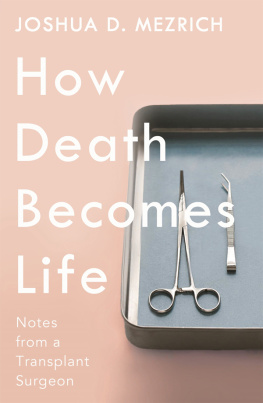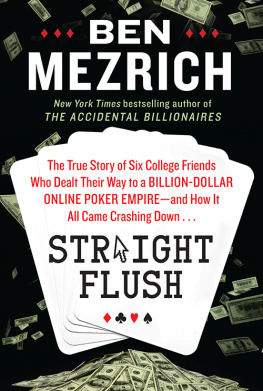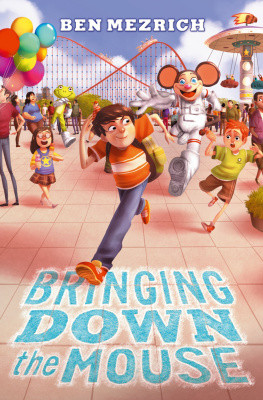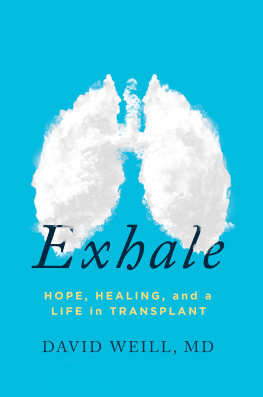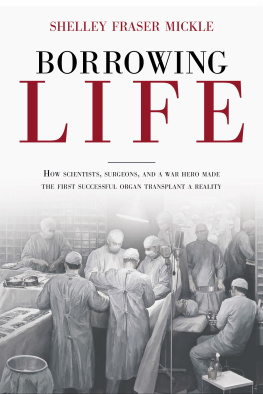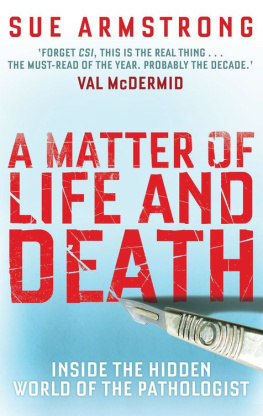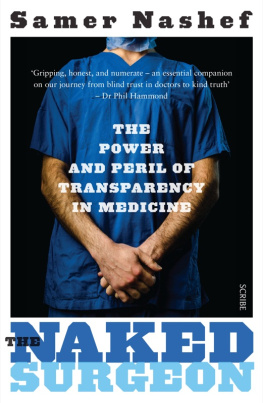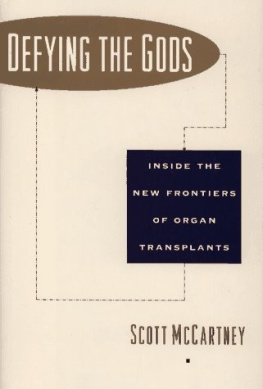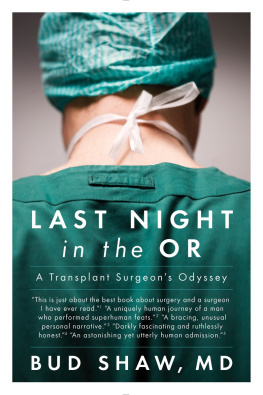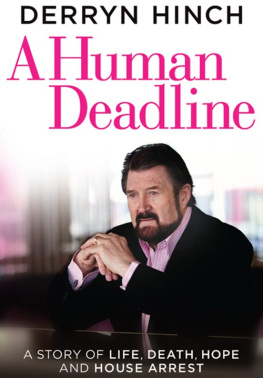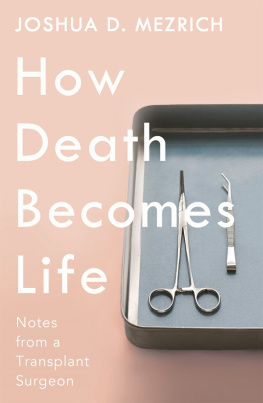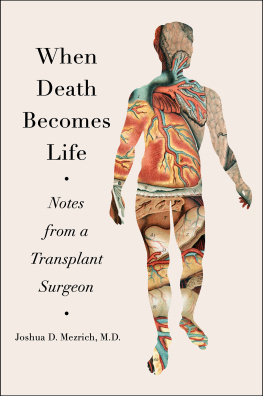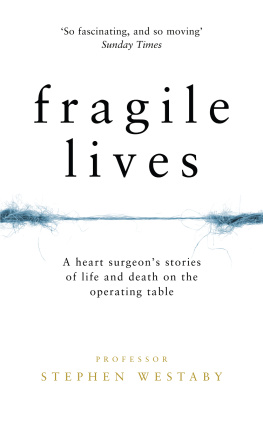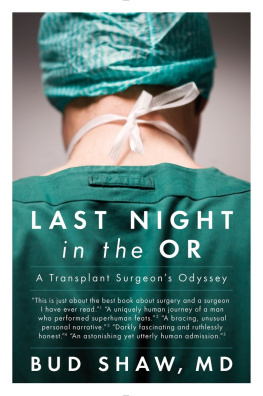Contents
Guide

For G, S, K, and P.
And for the donors, living and dead.
You are true heroes.

First published in the United States in 2019 by HarperCollins Publishers, 195 Broadway, New York, NY 10007.
Published in hardback and trade paperback in Great Britain in 2019
by Atlantic Books, an imprint of Atlantic Books Ltd.
Copyright Joshua D. Mezrich, 2019
The moral right of Joshua D. Mezrich to be identified as the author of this work has been asserted by him in accordance with the Copyright, Designs and Patents Act of 1988.
All rights reserved. No part of this publication may be reproduced, stored in a retrieval system, or transmitted in any form or by any means, electronic, mechanical, photocopying, recording, or otherwise, without the prior permission of both the copyright owner and the above publisher of this book.
Sympathy for the Devil, words and music by Mick Jagger and Keith Richards 1968 (Renewed) ABKCO Music, Inc., 85 Fifth Avenue, New York, NY 10003.
All rights reserved, used by permission of Alfred Mus.
10 9 8 7 6 5 4 3 2 1
A CIP catalogue record for this book is available from the British Library.
Hardback ISBN: 978 1 78649 886 1
Trade paperback ISBN: 978 1 78649 887 8
E-book ISBN: 978 1 78649 888 5
Printed in Great Britain
Atlantic Books
An imprint of Atlantic Books Ltd
Ormond House
2627 Boswell Street
London
WC1N 3JZ
www.atlantic-books.co.uk
Contents
Note from the Author
The following book is neither a memoir nor a complete history of transplantation. I am not old enough to write a memoir, and a few excellent complete histories of transplantation exist already (and are listed in the bibliography). My goal is not to provide a chronological depiction of my coming-of-age as a surgeon, but rather, to use my experiences and those of my patients to give context for the story of the modern pioneers who made transplantation a reality.
The remarkable events that allowed mankind to successfully transplant organs between two individuals that are not genetically identical occurred relatively recently. In the early 1950s, the idea of transplantation remained in the realm of science fiction. By the late 60s, multiple organs were being transplanted, with a few poignant successes and many failures. True success with organ transplantation was realized in 1983, with the approval of cyclosporine. These accomplishments were achieved on the backs of a relatively small number of truly incredible people.
My own training began with four years of medical school at Cornell University Medical College in New York City. I then did my surgical internship and first year of residency at the University of Chicago Hospital and Clinics. After that, I spent the next three years performing transplantation research at Massachusetts General Hospital. I then returned to the University of Chicago for three more years of surgical residency. Thereafter, I came to Madison, Wisconsin, where I completed a two-year fellowship in organ transplantation. I have been in Madison ever since, performing organ transplants and running a basic science lab studying the immune system.
By illustrating what it took for me to practice transplantation, and by painting a picture, with the stories of my patients, of how the discipline has touched so many, I hope to highlight the incredible gift transplantation is to all involved, from the donors to the recipients to those of us lucky enough to be the stewards of the organs. I also will show the true courage of the pioneers in transplant, those who had the courage to fail but also the courage to succeed.
All the details in this book are historically accurate and factual to the best of my knowledge, with some minor patient details changed in a few cases to protect the identity of an individual, if requested.
Milestones in Transplantation
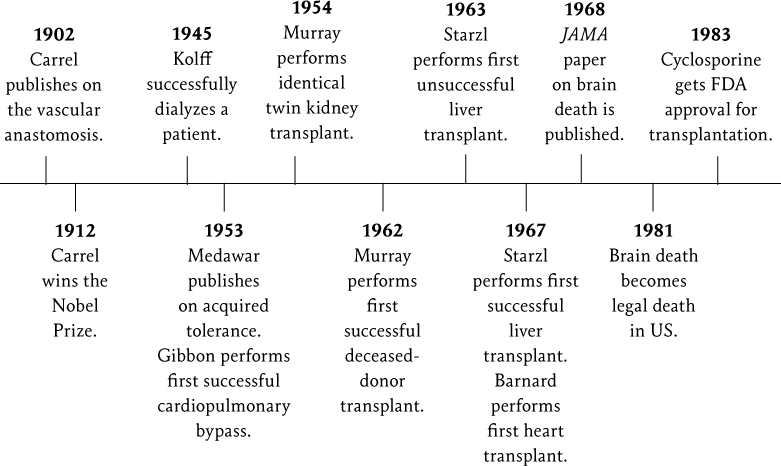
Dr Joshua D. Mezrich is an associate professor of surgery in the division of multi-organ transplantation at the University of Wisconsin School of Medicine and Public Health.
Part I
Out of Body
I have great respect for the past. If you dont know where youve come from, you dont know where youre going. I have respect for the past, but Im a person of the moment. Im here, and I do my best to be completely centered at the place Im at, then I go forward to the next place.
MAYA ANGELOU
We are not makers of history. We are made by history.
MARTIN LUTHER KING JR.
A Perfect Organ
In a Small Plane over the Hills of La Crosse, Wisconsin, September, 2:00 a.m.
While Id been on planes many times, Id never experienced the full power of a thunderstorm at ten thousand feet. The small King Air, a six-passenger dual prop, was bouncing around uncontrollably. Every few seconds, it would go into free fall and then hurl itself back up violently. The two pilots in the cockpit were hitting knobs and dials, trying to silence the various alarms that sounded as we rocked violently back and forth. It didnt help that our physicians assistant Mike, who had been on hundreds of flights in small planes before, was screaming uncontrollably, Were gonna die! Were gonna die!
Given that Mike was such a seasoned member of our team, I could only assume that this particular flight was going badly. When the pilots glanced back to see the source of the screaming and cursing, I could make out the fear in their eyes. I looked at the spinning altimeter and noted that our plane was popping up and down as much as a thousand feet at a time. Outside the window, the lightning was shooting horizontally. The rain was constant and loud, and I was sure I heard pieces of hail hitting the windshield.
IT WAS THE third month of my transplant fellowship at the University of Wisconsin. I hadnt chosen transplant surgery so I could fly through thunderstorms in the middle of the night over the fields of central Wisconsin. Hell, Id grown up in New Jersey, spent most of my life in the Northeast, and had never known anything about the Midwest. I had been drawn to Madison because it is one of the best places to be a transplant fellow. I was learning how to perform kidney, liver, and pancreas transplants, and how to take care of these complicated patients while they waited for organs and then recovered from their surgeries.
One unique part of the discipline of transplantation is the procurement of organs from donors. While we do perform transplants, particularly kidneys, with organs from living donors, the majority comes from people who have just died. Rather than transporting donors, who typically remain on a ventilator, brain dead but with a beating heart, we send a team out first, to meet with their families to thank them for their gift and then to perform the surgery to remove their organs. We then take those organs back for transplant into waiting patients.
On this particular day, Id received a phone call at around 5:00 p.m. telling me to come to the OPO (organ procurement organization) at 9:00 p.m., for wheels up at 9:30. The thirty-minute flight from Madison to La Crosse had been without incident. We arrived at the donor hospital at around 10:30. The donor was a young man (almost a boy) who had died in a motorcycle accident. That detail is easy to remember, as Wisconsin, being the land of Harley (not to mention a state where wearing a helmet is frowned upon), produces a never-ending supply of donors whove died in motorcycle accidents. In the winter, its snowmobile accidents, the snowmobile being the vehicle of choice for bar hopping in the eveningswhich sounds like fun but is also incredibly dangerous, given the power of those machines.

